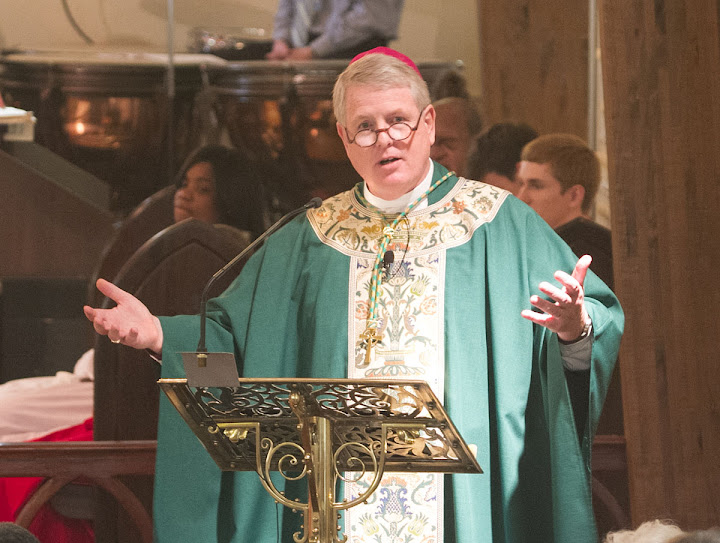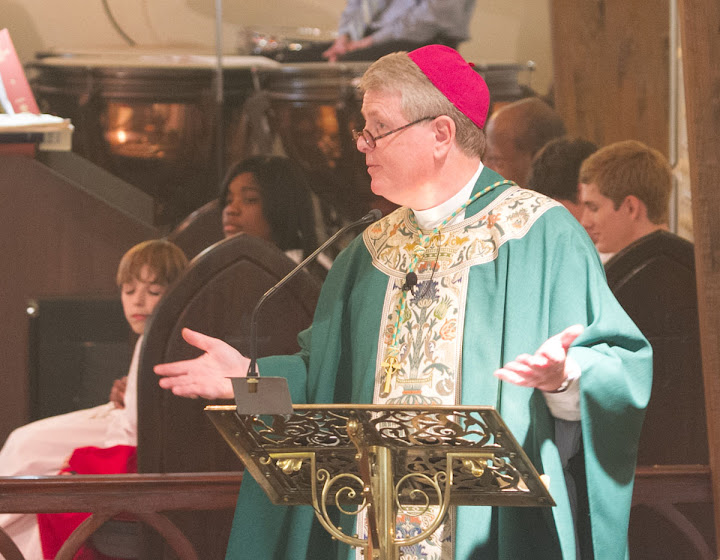The Rt. Rev. Scott Anson Benhase
10th Bishop of Georgia
It is wonderful to see the family of God from across the Diocese gathered together for Eucharist. This sermon will actually be a continuation of my bishop’s address, sort of a part 2, if you will. In a sense I’ve already preached on the Gospel earlier today, so I want to focus now on the last verse of our Epistle lesson this evening: In him the whole structure is joined together and grows into a holy temple in the Lord; in whom you also are built together spiritually into a dwelling-place for God.
What kind of church do we need to become so people would recognize us as “a dwelling-place for God?” Not recognize our buildings, mind you, but us, we who have attended ourselves as disciples of Jesus. What must we look like to those outside the Church for them to recognize us as truly “a dwelling-place for God?” And to continue my point from earlier today: what is weighing us down and hindering us from becoming just that dwelling-place for God? When others see us do they see a reflection of Jesus?
 Maybe many people out there aren’t interested in what they see in us or maybe they don’t care what we look like, but my hunch is there are many people in Georgia who are longing to truly dwell with God and they are hungry for a place and a people that are such dwellings or, as Bob Dylan sang, who are “Shelters from the Storm.”
Maybe many people out there aren’t interested in what they see in us or maybe they don’t care what we look like, but my hunch is there are many people in Georgia who are longing to truly dwell with God and they are hungry for a place and a people that are such dwellings or, as Bob Dylan sang, who are “Shelters from the Storm.”
To be such human dwellings, such shelters from the storm, I believe we need to peel back a lot of the artifice of church custom and habit. To extend my metaphor from earlier today, we need to limit what we hold in our dwellings so we don’t over-burden ourselves or over-burden those we’re inviting to share in “a dwelling-place for God.”
There’s an old church term called: Adiaphora, which refers to matters or practices that aren’t essential to our faith. My hunch is we pile a lot of things into that essential category that have no reason being there. It’s like living in a house for 2000 years where you continue to accumulate stuff. Your attic, all of your closets, and your garage become so cluttered that you’re in danger of becoming one of those people other folk talk about around town, you know, the crazy old guy who can’t throw anything away?
Of course, any dwelling has to have a basic structure or it cannot stand. So, what must we have to be a dwelling-place for God? Our classic Anglican “must have” is this: the Scriptures, Creeds, Sacraments, and Holy Orders, the so-called four pillars of the faith. Everything else, I believe, needs to be adiaphora – not essential.
For the past six months on my weekend parish visitations I’ve intentionally sought out meetings with young adults in our parishes to hear from them about their experience of our church and on what the church can be doing to reach out to other young adults. Boy, have I got an earful. The good news is young adults love our church. They love sacramental worship, the open-heartedness of the people they meet, and the generous spirit present in their congregations. But in every meeting at least one young adult has said: “Bishop, can we do something about the music? Can we sing something that sounds like the music I listen to?”My answer was “of course we can.” And we can, you know. But each of us has a church list that we deem essential for us.
We all like to see ourselves as flexible and open to the needs of others, that is, until something we want for ourselves is challenged. And then we dig in our heels.
As the old saying goes: “I’ve stopped preaching and now I’m meddling.”
 What are each of us willing to let go of or give away that we might be open to the needs of others? That is actually what repentance is all about. It’s about turning around, changing our way of thinking and acting, and letting go of some of our past practices so that we might follow the new direction of the Holy Spirit.
What are each of us willing to let go of or give away that we might be open to the needs of others? That is actually what repentance is all about. It’s about turning around, changing our way of thinking and acting, and letting go of some of our past practices so that we might follow the new direction of the Holy Spirit.
It’s easy to suggest to the church, or even to criticize the church about what changes it should make. It’s a far more difficult task to confront ourselves with a fearless spiritual inventory. So, as long as I’m meddling, what are you personally willing to give up or give away in order to renew the mission of the Church and become a more welcoming dwelling-place for God?
There’s a wonderful old Gospel hymn composed by Elisha Hoffman. Its chorus goes: “Is your all on the altar of sacrifice laid? Your heart does the Spirit control? You can only be blest and have peace and sweet rest, as you yield Him your body and soul.” In the spirit of that hymn, I’m going to do something you rarely see or hear in an Episcopal Church. I’m issuing an altar call. Not right now, don’t worry. But when you come forward for communion, I invite you to reflect on what you need to give up so you and your fellow disciples can become a hospitable dwelling-place for God in your congregation. As you kneel, prayerfully leave it on the altar of the church.
And as you get up, take with you the grace and mercy of God made really present in the Body & Blood of Jesus. And as we leave this place this night, may we all recommit ourselves to be hands, heart, and feet of Jesus in this anxious and confusing world. For it is to that Jesus that we ascribe all honor, power, glory, and might, this night, and forever more.
